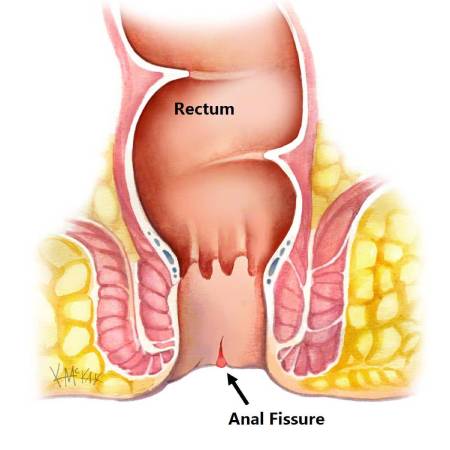
What is an Anal Fissure?
An anal fissure is a small tear or cut in the lining of the anal canal, often caused by passing hard or large stools. This tear can lead to sharp pain, bleeding and discomfort during or after bowel movements. While anal fissures are common and generally not serious, they can be extremely painful and affect daily life if left untreated.
What causes an Anal Fissure?
Anal fissures can develop for several reasons, including:
- Passing hard or dry stools (constipation)
- Straining during bowel movements
- Chronic diarrhea
- Inflammatory bowel diseases (like Crohn’s disease)
- Childbirth (post-delivery tearing in women)
- Repeated anal trauma or tight anal sphincter muscles
Sometimes, fissures may also appear without any obvious cause — these are called idiopathic fissures.
What are the symptoms of an Anal Fissure
- Sharp or burning pain during bowel movements
- Bright red blood on the toilet paper or in the stool
- A visible crack or tear in the skin near the anus
- Muscle spasms in the anal region
- Itching, irritation or discomfort while sitting
How is an Anal Fissure diagnosed
A doctor can typically diagnose an anal fissure through a physical examination of the anal area. In some cases, especially if the fissure is internal or recurrent, additional tests like anoscopy or sigmoidoscopy may be recommended to rule out other conditions such as hemorrhoids, abscesses or cancer.
How can Anal Fissures be treated?
Anal fissures can often heal on their own with simple lifestyle changes such as eating a high-fiber diet, staying hydrated and avoiding straining during bowel movements. Warm sitz baths, topical ointments and stool softeners may also provide relief. For chronic or non-healing fissures, advanced options like Botox injections, laser therapy or minor surgery (lateral internal sphincterotomy) may be recommended. Ayurvedic treatments are also available, offering natural healing through herbal remedies and therapies like Kshar Sutra. Choosing the right treatment depends on the severity and duration of the fissure.
What if the Fissure becomes chronic?
A fissure is considered chronic if it lasts longer than 6 weeks or keeps coming back. In such cases, advanced treatments may be necessary, including:
- Botox injections to relax the sphincter muscle
- Lateral internal sphincterotomy (LIS) – a minor surgical procedure where a small portion of the anal muscle is cut to reduce tension and allow healing
- Laser treatment – a minimally invasive option with faster recovery and less pain
Is there an Ayurvedic treatment for Anal Fissures?
Yes. Ayurveda offers a holistic, natural approach for managing anal fissures, focusing on detoxification and healing:
- Kshar Sutra therapy for chronic cases
- Panchakarma therapies (like Basti) for internal cleansing and long-term prevention
- Herbal remedies like Triphala, Haritaki and Guggulu
- Jatyadi oil or Nirgundi oil for topical application